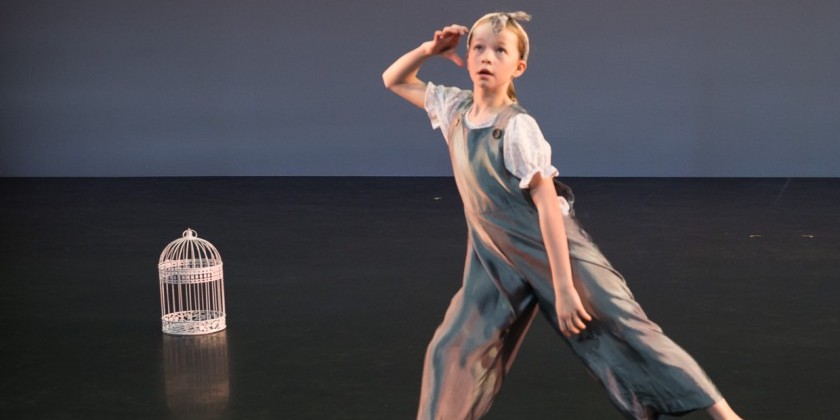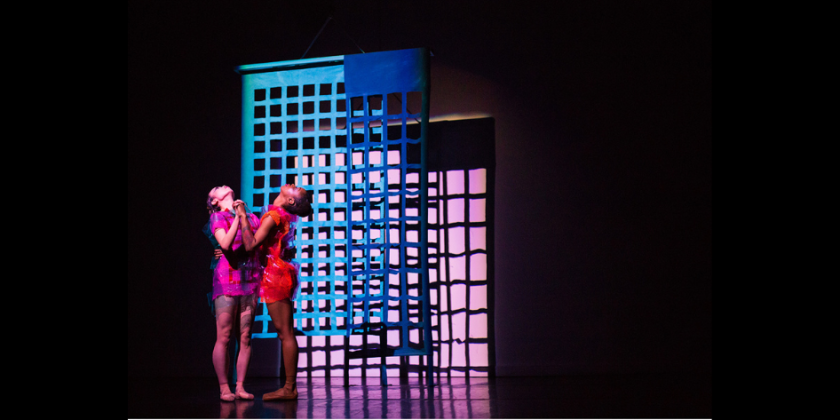IMPRESSIONS: Bebe Miller Company and Susan Rethorst's "The Making Room" at New York Live Arts

Stealing from Myself (Rethorst) and In a Rhythm (Miller)
Dance Artists: Gabrielle Revlock and Gregory Holt (Stealing from Myself) and Michelle Boule, Christal Brown, Sarah Gamblin, Angie Hauser, Darrell Jones (originating artist), Bronwen MacAurther, Bebe Miller, Trebien Pollard (In a Rhythm)
February 21, 2018 at 7:30 p.m.
The evening is uncharacteristically warm, and the New York Live Arts theater is particularly balmy with the scent of impending spring hanging throughout my experience of The Making Room, Bebe Miller and Susan Rethorst’s collaborative dissection of process.
Miller and Rethorst met in the 1970s, before embarking on divergent careers as choreographers. What brings them together now is a mutual interest in collecting ideas about the creative process and sharing them in their split-bill program.
The Making Room is an unfinished yet thought-provoking experiment that doesn’t stop at the theater doors. A website (www.makingroom.org) containing media and text materials generated during rehearsals can be visited to continue the experience.

During In a Rhythm, Miller makes a comment that holds relevance throughout the program: “What I remember and what I carry with me is what I measure the present moment against.” Thus, all the factors that affect how a person experiences a performance then, in a way, become part of the performance itself: the environment, activities prior to the show, everything in a life up to this moment.
The influence of literature appears throughout In a Rhythm. Miller opines on the process of creating and translating art through the filter of authors like Toni Morrison, David Foster Wallace, and Gertrude Stein. Art doesn’t exist in a vacuum; it contains within itself a rich history of influence.
Although accompanied by a group of dancers, Miller is an omniscient presence, eloquent and engaging as she recites from a grant application, like a grandmother reading a story by a fireplace. She pauses for a moment: “I did not get this grant.” In the background, her performers have found stillness, with the exception of one young woman, who moves almost aimlessly. Miller sighs and says, “ We keep going.”

In a notable moment, the word “YOU” is repeated in a multitude of contexts, conveying a sense of accusation: “you took my heart away” and “you took my love.” The text is illustrated visually with one dancer’s foot on another’s chest.
Rolls of carpet on the sidelines get rolled out like runways. Squares of felt become colorful ponchos. Eventually all the fabric and props are tossed to the sidelines, like a graveyard of unfinished thoughts, a visual representation of process.
Miller concludes abruptly. She declares, “I’m going to stop this,” and the piece ends. Ultimately, the process of art never ends; the dance lives with us, perhaps shifting and morphing in our minds after we leave the theater.

In Rethorst’s Stealing from Myself, cheeky Gabrielle Revlock and deadpan Gregory Holt shuffle around in mismatched tropical garb, like a bored couple stuck inside their beach house on a rainy day.
They engage in gestural dialogue, which evolves into mini-skits that dissipate before developing much substance. Two chairs are rearranged to place the characters in different relationships. Most of the piece is in silence, but occasional spurts of music suggest a mood that momentarily lends a cinematic feel.

The gestural specificity is what’s compelling. Revlock traces a finger down Holt’s body. Does that imply sexuality? The pair faces each other across the stage — he sits as she stands behind the chair. Are they having a challenging conversation? The charade-like nature of Rethorst’s movement provokes thoughts about gesture and meaning — can any gesture really be completely abstract, or do gestures take on meaning as we compare them to our lives and experiences?
Who knows? And Miller and Rethorst aren’t here to tell us one way or another. Although taken as a performance, the works can be dry, but they, like all art, can imprint themselves on us and inform the next piece we see.













